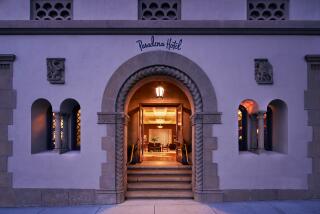Syria’s Faded Jewel : Baron’s--A Hotel Filled With History
- Share via
ALEPPO, Syria — There are not many hotels in the world where the manager can go back through the guest register to the 1930s and proudly display the signatures of Agatha Christie and T.E. Lawrence.
But at Baron’s Hotel, once considered the finest hotel in the Near East, this sort of thing is commonplace.
Like an aging dowager, Baron’s has lost its beauty. But it still calls up images of an era when most people traveled by train, when women wore sensible shoes and when everybody dressed for dinner.
Facing Hard Times
“Baron’s has fallen on pretty hard times, I’m afraid,” Krikor A. Mazlumian, a former owner, said the other day.
Mazlumian, 76, is the affable Armenian whose father built the hotel and who has been in charge since, well, since Teddy Roosevelt signed in as “governor of the Philippines.”
In a clipped British accent, Mazlumian acknowledges that the hotel has not been renovated in about 30 years, in large measure because the Syrian Ministry of Tourism will not allow him to raise the rates. The best room in the house goes for 80 Syrian pounds, about $8 at the prevailing exchange rate for tourists.
Consequently, the walls are covered with dust, the beds are unyielding to the human form, and the enamel has been slowly washed away on the 10-foot-long bathtubs. But breakfast is still served on Royal Doulton china, probably shipped out before the war. To Mazlumian, “the war” is World War I.
Tattered Armchairs
Seated in one of the tattered leather armchairs in the bar, listening to Mazlumian’s recollections, it is easy to conjure up the lost grandeur of Baron’s.
The hotel’s cachet is derived from the ancient city of Aleppo, which dates back to thousands of years before the Christian era and is one of the most alluring cities in the Arab world.
Aleppo was an important point on the old caravan route across Syria to Baghdad, and much later it was one of the last stops on the Orient Express from Paris. It has an ancient, covered bazaar that exudes the bouquet of exotic spices, that is crowded with droning vegetable sellers and importuning carpet salesmen.
Remarkably, the city has changed but little. Tourists still come to see the Great Mosque that was built in the 8th Century and the citadel that held off the Crusaders in the 12th Century.
When Baron’s was opened in 1911 (the word baron is the polite Armenian equivalent of “mister”), Aleppo was a part of the Ottoman Empire; the inaugural ceremonies featured the Turkish Army Band. The Turks lost the war, and afterward part of the empire was carved up by France and Britain.
King Tossed Out
King Faisal of Iraq, leader of the Great Arab Revolt against the Turks, took a suite at Baron’s, where he stayed until the French colonialists unceremoniously tossed him out. The French themselves departed when Syria became independent in 1946.
Mazlumian recalls that in its early days, the hotel was on the edge of the city, and the countryside began across the street. Now, Baron Street is in the center of Aleppo.
One of Mazlumian’s earliest recollections is of the German maitre d’hotel, Paul, an aloof figure in dinner jacket who committed suicide in his basement quarters after falling in love with a nun at the local convent. Subsequently, the hotel employed Armenian help, Mazlumian recalls with an impish grin.
Christie a Client
Most of the Baron’s clients consisted of transients, people taking the train to Baghdad, among them the British novelist Agatha Christie, who signed the register under her married name, Mallowan. That was in 1934, when taking a sleeping car from Istanbul was the “thing to do.”
Mazlumian remembers the author sitting in a corner of the terrace jotting down notes for what became her classic mystery, “Murder on the Orient Express.”
“Agatha Christie had a beautiful face and . . . always looked like she could read your mind,” he recalled. “She used to sit in the corner and write.”
Another aficionado of the Baron’s terrace was T.E. Lawrence--Lawrence of Arabia. He wrote several letters home in which he praised the hotel. One of his bills is preserved in the sitting room.
Stopover for Aviators
The hotel became prosperous in the 1930s, when, through an accident of geography, Aleppo became a stopover for daring young aviators setting records flying around the world.
Charles Lindbergh signed the register in 1937, and the pages are filled with the jaunty script of British and Australian fliers who passed through, among them Sir Charles Kingsford-Smith, who set many early flying records.
Married in England
Mazlumian, who has countless photographs of men in leather helmets, was so taken with the idea of flying that he went to England to learn how. While there, he married an Englishwoman.
Mazlumian, who has the almost-total recall of a house detective, has an anecdote or two about most of his famous guests. One, Van-Lear Black, a banker and chairman of the firm that published the Baltimore Sun, had his valet take everyone in the hotel out to a cabaret.
Scanning the register, Mazlumian dismisses some guests with a snort or a barbed description: “a notorious Frenchman,” “a notorious German.” One wonders what made them notorious, but Mazlumian does not elaborate.
Banks Took Hotel
In the 1950s, Mazlumian’s family lost the hotel in what he calls a misunderstanding with the banks. His daughter and son are in charge for now, but it is not clear for how long.
Of the brace of golden retrievers that once proudly guarded the sweeping staircase, one has died and one walks with a limp.
The one thing that has not changed is the hotel’s popularity. Despite all the hard times, Baron’s Hotel is almost always fully booked.
More to Read
Sign up for The Wild
We’ll help you find the best places to hike, bike and run, as well as the perfect silent spots for meditation and yoga.
You may occasionally receive promotional content from the Los Angeles Times.






